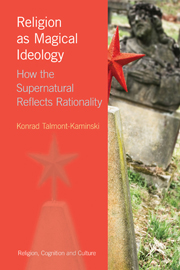4 - Magic as cognitive by-product
Summary
The main point of the previous chapter was that magical and religious beliefs can be identified as that subset of beliefs that is largely shaped by the idiosyncratic nature of our cognitive mechanisms and the specific details of our cultures. Tis is the case as these beliefs are superempirical — protected against empirical considerations by dint of their contents, as well as their social and methodological contexts. In this respect, these beliefs were contrasted against scientific beliefs, whose context acts to force them into contact with empirical evidence. The religious beliefs, when compared with magical beliefs, were found to be even more divorced from evidence as the purported effects of religious practices were superempirical in themselves — unlike those of magical practices. The degree to which superempirical beliefs are removed from mundane considerations led to the question of what it is that renders them relevant enough to be considered by people. To understand that, it is necessary to look at magical beliefs and practices and to consider the concrete mechanisms responsible for their appearance and stabilization.
One of the earliest things noticed about magical beliefs, already stressed by Malinowski, was that magical beliefs have a tendency to appear in situations where people feel threatened. Malinowski interpreted this correlation as showing that the function of magical beliefs is to reduce our anxiety by making us think we are in control when, actually, we have no control. This interpretation has been followed up by a line of research into a motivational account of magical beliefs that has provided a lot of interesting results.
- Type
- Chapter
- Information
- Religion as Magical IdeologyHow the Supernatural Reflects Rationality, pp. 73 - 96Publisher: Acumen PublishingPrint publication year: 2013



